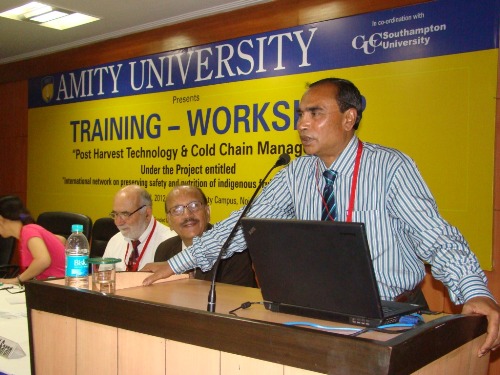20 Mar 2012-22 Mar 2012|Noida | Amity University Campus, Sector-125 Noida
Three-Day Training Workshop on “International Network On Preserving Safety And Nutrition Of Indigenous Fruits And Their Derivatives" begins at Amity University

Amity International Centre for Post Harvest Technology and Cold Chain Management (AICPHT&CCM) started a Three-Day Training Workshop on “International Network On Preserving Safety And Nutrition Of Indigenous Fruits And Their Derivatives” today at Amity University Campus, Sector-125, Noida.
The workshop comprises of training sessions and demonstrations on “Post Harvest Technology” and “ Cold Chain Management” covering a host of contemporary issues such as “Influence of post-harvest operations, packaging and storage on the quality of fruits”, “Different methods of processing, preparation of processed products and minimal processing of fruits”, “Low Cost Techniques of Storage: Construction and operation of Zero Energy Cool Chamber “and “Biotechnological approaches in post harvest management – overview”.
The workshop is funded by the Leverhulme Trust, UK in which participating partners are from UK, France, Sri Lanka, Bangladesh, Vietnam and Cambodia who would apprise the participants with the several methods to control losses while delivering from farm to fork.
Over 25 delegates from Research and Government organisations, Academic and Educational institutions are attending the Workshop including Field Foods Private Limited (A Bharti Enterprise), Deptt. Of Food Science & Techology, Dr. YS Parmar University of Horticulture & Forestry, Future Group, Food Pack Division, Allahabad Agriculture University, Govind Ballap Pant University of Agriculture & Technology and others.
Dr. Max Reynes, Research Officer, France explained the use of Lactoperoxydase for post-harvest treatment of mangoes and shared his research which he did on most of the varieties of mangoes world-wide to judge the rate of deterioration of the fruits under various conditions.
Sharing his views on ˜Post-harvest technologies of indigenous fruits of Bangladesh: Constraints & Opportunities”, Dr. Mohan Gopal Saha, Principal Scientific Officer, Bangladesh Horticultural Research Centre, Bangladesh Agricultural Research Institute highlighted the importance of Post Harvest Technologies in Bangladesh with special reference to Mango, Jackfruit, Banana, Litchi, Pineapple, Gauva, Papaya and Ber . The Post harvest technologies if employed properly, he stressed, could result in Minimization of Postharvest losses, Nutritional Improvement, Enhancing Food and Financial Security and Employment Generation Dr. Saha dwelt on the maturity indices, handling, chemical treatments, packaging, transportation and storage and finally, the processing and preservation of various indigenous in the form of jams, jellies, pickles. Dr. Saha also outlined the opportunities and constraints of Post Harvest technologies in Bangladesh and stressed that it is high time to minimize postharvest losses of indigenous fruits through improved postharvest practices especially through the use of Cold Chain Management.
Prof. D A Nimal Dharmasena, Department of Agriculture Engineering, University of Peradeniya Sri Lanka, shared his views on the present status, issues and future trends in fruit and vegetble handling, distribution and marketing in Sri Lanka. Prof. Dharmasena began by giving an introduction of the agriculture and food security of Sri lanka which is an agriculture based country Prof. Dharamsena stressed on the numerous barriers faced by farmers, mainly due to the complicated market hierarchy and lack of proper pricing system in Bangladesh as a result of which wholesalers get-to-gether and decide the price on their own , thus reducing the profits of the farmers. If the supply is in excess then it leads to very high postharvest losses owing to the dearth of temporary storage facilities. “Average losses of fruits and vegetbles under traditional distribution chain is 30-40% in Bangladesh .Supermarkets, on the other hand, with their modern facilities are bringing a change with the average loss accounting between 2-6%. Supermarkets directly purchase from the farmers, skipping the middleman, leading to higher profits for farmers as well as better quality for consumers.” remarked Prof. Dharmasena.
Ms. Duong Thi Ngoc Diep, Lecturer-Nong Lam University, Vietnam explained the Utilization of Cashew Apple in Vietnam which is the world’s second biggest country producing cashews after India. Ms. Diep outlined the fact that how cashew apples are usually discarded after the cashew nuts are extracted from them, leading to losses for farmers and a lot of wastage of potential food material. Cashew apples are usually used for minor purposes in Vietnam (like making wine or cashew apple chips), mostly by households rather than industries. Ms. Diep encouraged the optimum use of Cashew Apples, not only for Vietnam but other countries too, which could generate jobs for workers, increase the income of farmers and reduce environmental pollution.